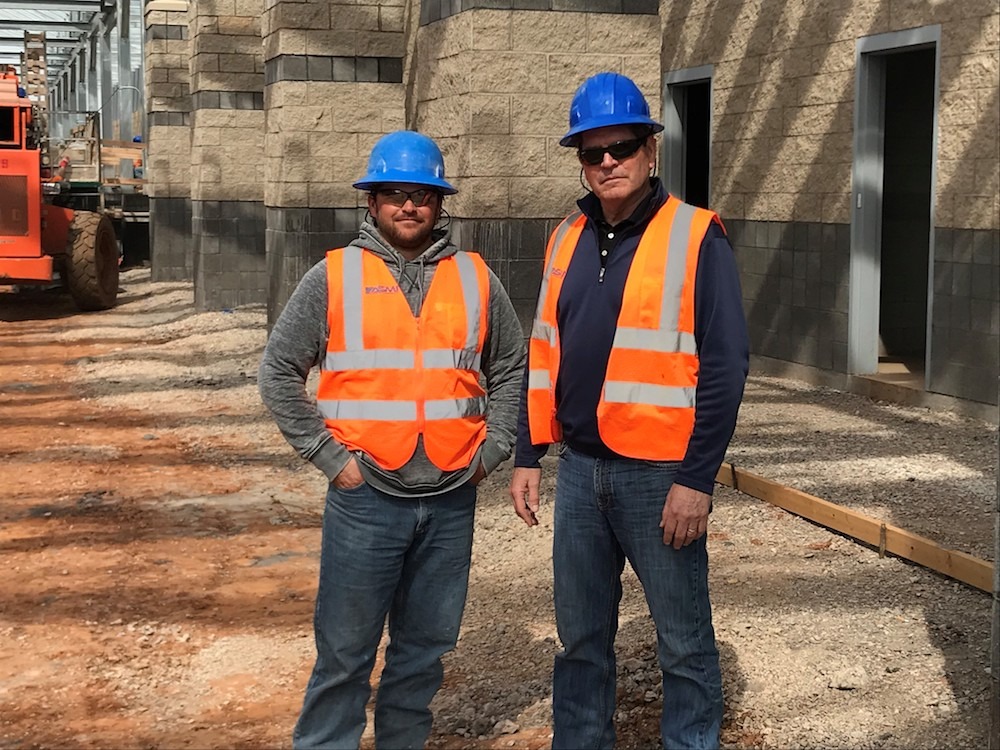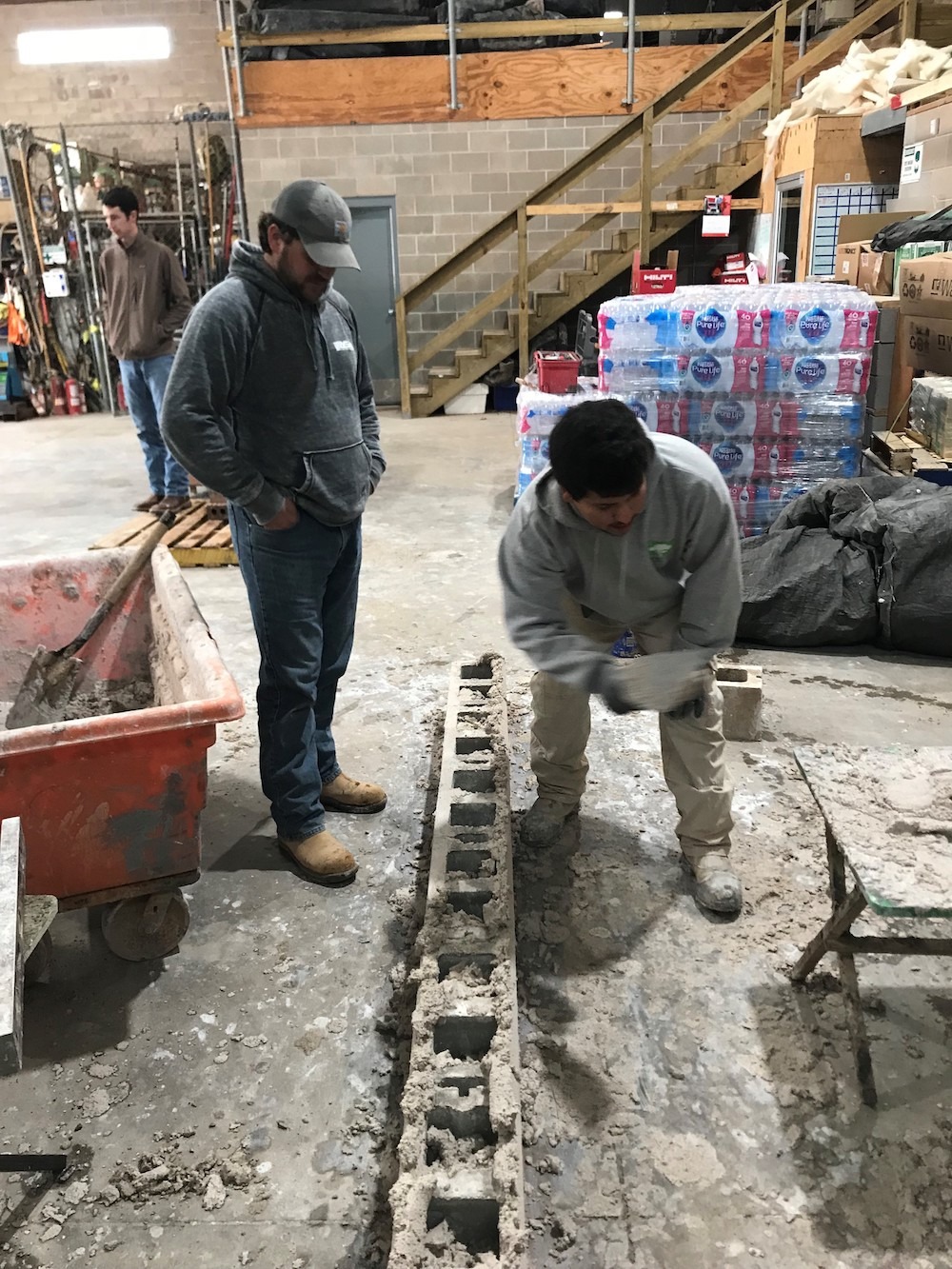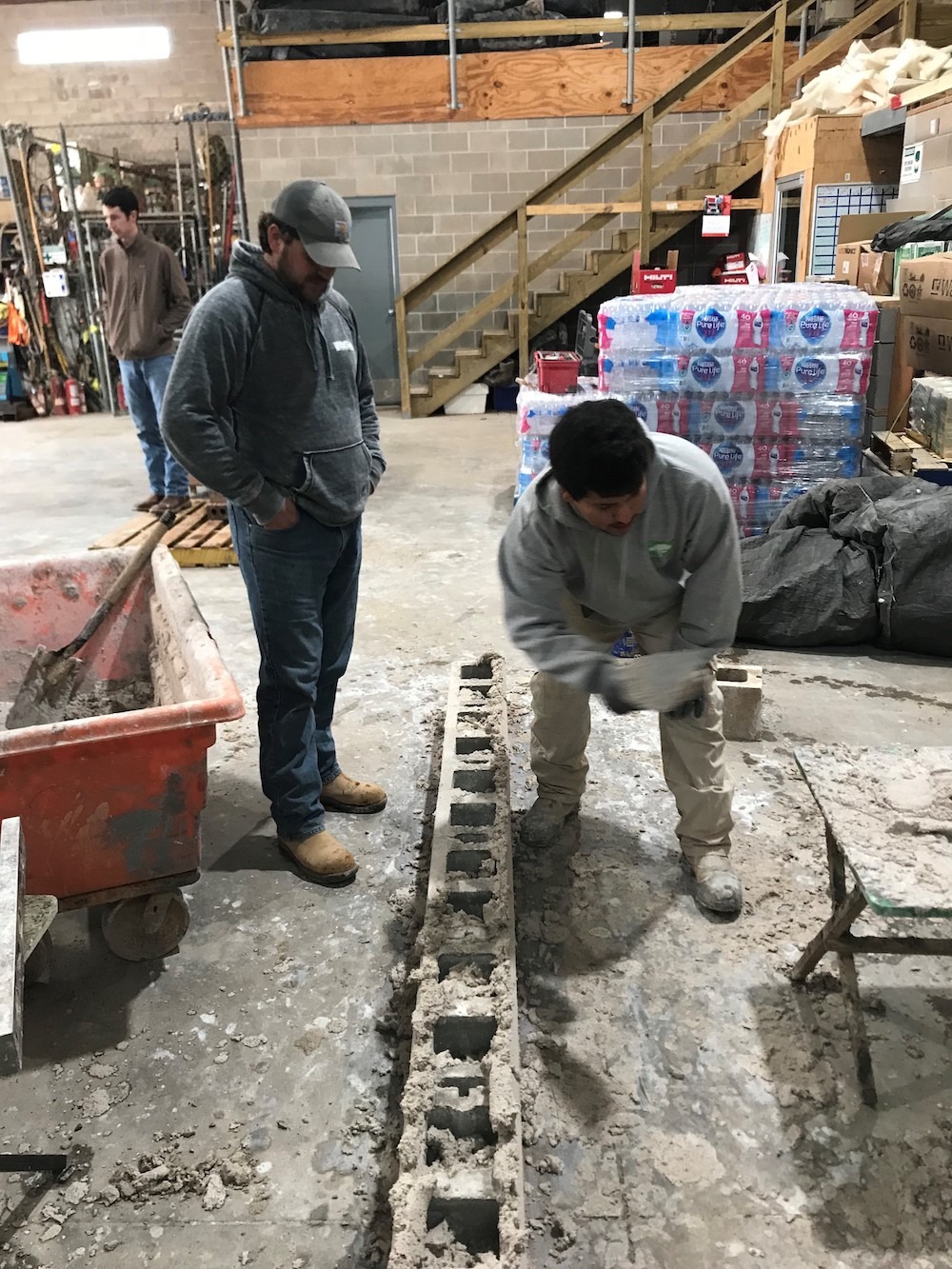In our eighth GEN NXT interview we had the opportunity to speak with Adam Slattery, Field Superintendent at Al Slattery Masonry Inc. in Oklahoma City, OK. It was a pleasure learning his story and about his experiences in the industry. We also thank JagClamp for continuing to sponsor this important series.
Masonry Magazine: Lets start with a little background, how did you get started in the industry?
Adam Slattery: My background goes way back to my early childhood, days of going to work with my dad in the summer, when my brother and I were five and six years old. During the summer we’d end up sleeping on the floorboard of my father’s truck while he was working in the mornings. Then we would get up and out, acting like we were helping him, those are my first memories of the masonry industry. Summers and days off from school with my dad doing repair work, that’s where he started his business back in ’87. He did repair work, mailboxes, flowerbeds, and stuff like that.
We actually had our hands in the mortar at a very early age. It wasn’t big commercial jobsites or anything like that. It kind of evolved from there. Once I got to high school age, I did the career check here in Oklahoma. I had all the basic fundamentals, but I was really able to hone my skills. At the career check my junior year of high school kind of paved the way, after graduation I knew what I wanted to do. I did some college, but that wasn’t really for me. I wanted to be more hands-on in the field and that’s kind of my early background and the start of my career.
M.M.: You mentioned college wasn’t for you, did you do any apprenticeships or was it mostly working with your family?
A.S.: By the time I was college age, we were doing 95% commercial, so I guess my apprenticeship was basically the summers when I was 14-16 years old, and throughout high school. Then I’d work on the job, and took 9-12 hour classes full-time a semester, the couple of years I went to college.
By then I decided the college deal wasn’t for me full time, I was at a crossroad of where I either needed to go to school full time to finish my degree or go to work. I went to work and ran my first job when I was 20 years old. I never looked back. So at the early age I was kind of the one that wanted to do it my way. The only option for my dad was to put me on my own and let me sink or swim.
M.M.: How is it working with family?
A.S.: Its got its hard days and its good days. I get to spend time with my parent, which I really cherish. In the same token it makes life tough, because a lot of times you’re in the heat of dealing with stuff and you have to put the father-son, or in my case, my mother is involved in the business as well. So you have to put the father-son or the mother-son relationship to the side sometimes and understand that it is business too. Overall I wouldn’t trade it for anything, a lot of people may not have that close connection with their parents. But I see my parents at work everyday and I see them on the weekends and I get plenty of time with them. It has its tough days and its good days.
M.M.: Were you ever given a hard time by some of the guys while working when you were younger?
A.S.: Everyday! I don’t know if it magnified it being the boss’s son. A lot of the guys knew me when I was a pain-in-the-butt teenager. Coming up I was a typical teenager antagonizing the guys. So when I grew up, sure I got a hard time and being young in the industry 17 years ago, and being out on a job and learning the job. It took a long time for the older guys in other trades, even our employees to take to younger guys. It took a long time to gain their respect. I’ve had plenty of hard times with plenty of people inside and outside of the trade. It’s just the nature of the business.
M.M.: What interests you about the industry?
A.S.: When I was a young kid getting into it, I think I was like every other kid. 1. I wanted to be like my dad, and then 2. All the big equipment, the tractors, the cranes and other big equipment obviously had a big impact on me. I wanted to be like my dad, I always outside in the sandbox you know, doing things with my hands. In high school I took two hours of wood shop, I always wanted to work with my hands. At a young age it was those things combined.
As I’m growing older, I’ve been out of high school 17 years, and I used to ride around with my dad and he’d say, “I’ve worked on that job and that job.” And now that I’ve been on the job for 17 years I get to drive around town and tell my wife and friends, and someday my kids, “Hey I helped build that.” It’s very rewarding driving around and seeing buildings you’re a part of. It brings back some good memories and some not-so-good memories. At the end of the day it’s a very rewarding trade.
M.M.: How did you get to where you are today?
A.S.: A lot of hard work, a lot of long hours. My parents raised me right, and I have to give a lot of credit to them for where I’m at today. For one, in the company, secondly being in the position to make the company mine someday, a lot of it goes to my parents. They instilled the work ethic, the “you want something, work for it,” kind of attitude. My brother and I worked for our first vehicle. We worked just like everybody else, well we say everybody else, but a lot of people. But we worked for our own vehicle. We didn’t have it given to us.
We worked our summers, even at the earliest of ages when we worked with our dad, he would pay us and we’d go and put it in an account. So when we were of age to get a vehicle we had that checking account for the vehicle. We were always being pushed to work for what you want. As opposed to being spoon-fed I guess you could say. So it goes back to my parents and what they instilled in me at a young age. Watching my dad during the summer, working from sun up to sun down, watching and knowing if you want something you have to work for it.
M.M.: Tell us about your involvement in the MCAA.
A.S.: We’ve been members for at least 10 years. My dad has been the State Chairman for Oklahoma. I’ve been trying to get more active in the last couple of years in the MCAA. Just how its evolved over the past 5-7 years and what it’s doing for the industry has driven me to get more involved and be more active. Being a part of the MCAA has been invaluable for everything they offer and the networking with other members. You have a group of guys that can pick up the phone and say, “hey have you done this,” or “how is this working for you,” networking is a big part of it. With any organization there’s advocacy, a voice in Washington D.C. The price we pay for the MCAA is worth it along just to have that voice in Washington, along with everything else that comes along with it.
M.M.: How have your work experiences been with the younger generation?
A.S.: Kind of a mixed bag, you definitely have to treat them way different from when I was coming up. The younger generation don’t take to the rough and tumble, screaming and yelling. You have to get your point across in a different manner. If you could figure how to manipulate that manner then you could get most of them to work for you. We instill that into some, but the younger generation is just their own deal.
The biggest thing, is figuring each one of them out, with each one there is something that makes them tick. It’s not just being out there and being hard on them anymore, like it used to be 20 years ago. You have to handle it a little more gingerly, which brings up the morale if there’s not a lot of yelling and screaming going on. They react more to you when you’re talking their level. But it’s definitely a challenge.
M.M.: What advice would you give to anyone interested in the industry?
A.S.: You have to get out there and give it a shot. You’re only going to get out what you put into it. We pay apprentices while we train them, and we pay retired masons to do our training for us. If you give the time you’re going to get something in return. Learning the masonry trade is something that no one can take away from you. I tell these guys all the time, learn it and even if it’s not what you do for your career path.
It’s something you could always come back to. It’s like riding a bike once you learn the rhythm of being a mason that’s something that nobody can take away from you.
You’re going to get out of it what you put into it. If you don’t want to show up to the training then you’re not going to make it. But if you show up and put forth 100% then you’re going to get something invaluable in return. A skill trade in the future is going to be invaluable, with the older generations retiring the younger generations need to know that you can make a good living being a craftsman. If you’re a good craftsman and hustler then you can get out and get side jobs, making a good living not having a degree. There are a lot of people in the industry making good money and that don’t have a degree.


